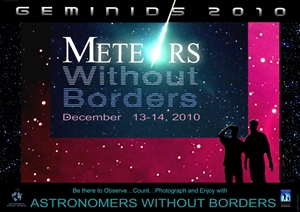
Earth encounters the Geminid Meteor Shower each December. For 2010, this shower will begin December 7th and end around December 17th. To celebrate this event, AWB is spearheading a new project called Meteors Without Borders (MwB), scheduled for the peak of the shower on December 13th and 14th.
Most meteor showers originate from the dust left behind by a comet. However, this one is birthed from an asteroid called 3200 Phaethon—a near-Earth (or Earth-crossing) asteroid that lives in the intermediate main belt. 3200 Phaethon is also called an Apollo asteroid (Palladian or Pallas family) and is a B-type carbonaceous asteroid with a high inclination.
These particular meteors are slow-moving and radiate out of the constellation Gemini, or “the Twins.” Although most meteors seem to emanate from that constellation, be aware that they can appear in other areas in that same vicinity. The average number of meteors is about 120 per hour and will achieve maximum after midnight.
The constellation Gemini is located on its side, above and to the left of Betelgeuse, the bright star in Orion’s left shoulder. Focus near the star Castor, which was discovered to be a visual binary in 1678 and is the second brightest star in the constellation Gemini.
How to get involved:
We invite groups and individuals around the world to celebrate “Meteors without Borders: Geminids 2010” with us. In addition to enjoying the meteor shower, we encourage you to report your meteor data to International Meteor Organization (IMO) - see under “Resources,” below.
We also encourage you to send photos of your event and a brief report to the AWB Members’ Blog.
Your meteor-viewing experience may be not only scientific but also creative and emotional, and it can take many forms. Feel free to put your thoughts and feelings into words and send your meteor-poems to AWB's Astropoetry Blog (Send to [email protected])
Clear skies to all...
Resources:
Geminids 2010 details at IMO
Radiant point for Geminids 2010 meteor shower at EarthSky
Submit your Visual Meteor Observation data to IMO
Visual Meteor Observation information at IMO







